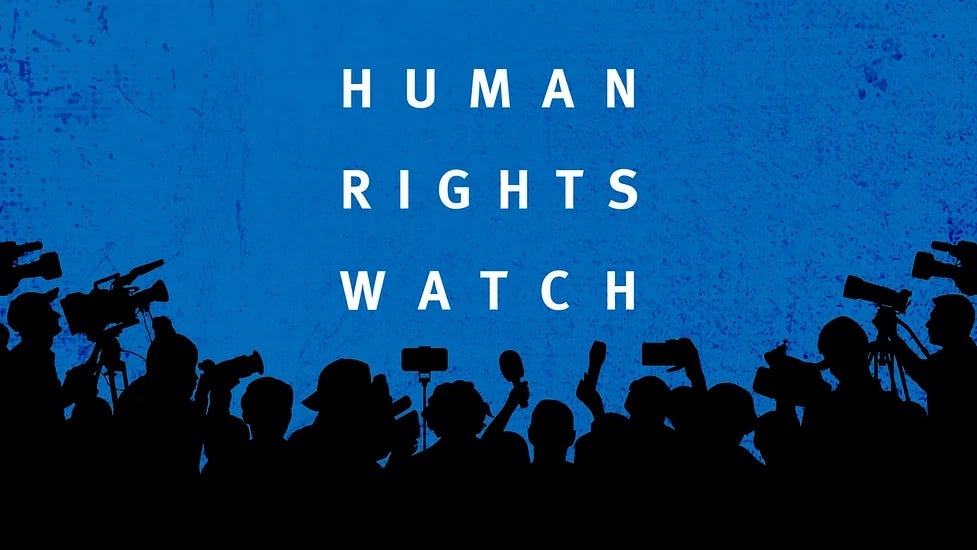
https://www.hrw.org/news/2024/
For Immediate Release 12 January 2024
Bangladesh: Repression, Security Force Abuses Discredit Elections
Key International Partners Should Call for Independent Inquiry into Abuses
(Bangkok, January 11, 2024) – Bangladesh authorities suppressed dissent including by arresting people for criticizing the government in social media posts, and undermined pledges of a free and fair vote with widespread repression and violence against opposition members ahead of the general election, Human Rights Watch said today in its World Report 2024. The Sheikh Hasina government returned to office for a fourth consecutive term after the January 7 elections which were boycotted by the main opposition parties because they had no faith in a free and fair polling process.
Abuses including arbitrary arrests, torture, extortion, and intimidation by security forces were replicated in the refugee camps where over 1 million Rohingya remained, unable to safely return to Myanmar.
“Bangladesh’s key trade partners should insist upon an independent inquiry into security force abuses as a condition of their continued business,” said Meenakshi Ganguly, deputy Asia director at Human Rights Watch. “The lack of accountability for serious rights violations is fomenting a corrupt culture where Bangladeshis fear being killed or disappeared by law enforcers for their political views, or even because they fail to pay a bribe.”
In the 740-page World Report 2024, its 34th edition, Human Rights Watch reviews human rights practices in more than 100 countries. In her introductory essay, Executive Director Tirana Hassan says that 2023 was a consequential year not only for human rights suppression and wartime atrocities but also for selective government outrage and transactional diplomacy that carried profound costs for the rights of those not in on the deal. But she says there were also signs of hope, showing the possibility of a different path, and calls on governments to consistently uphold their human rights obligations.
The Awami League-led government of Prime Minister Sheikh Hasina arrested over 8,000 leaders and supporters of the opposition Bangladesh Nationalist Party (BNP) ahead of the elections, in an overt attempt to incapacitate the competition and disqualify opposition leaders from participating. Many were allegedly “disappeared” when police arrested and kept them in unlawful detention for days or weeks before eventually producing them in court.
According to Bangladeshi human rights monitors, security forces have carried out more than 600 enforced disappearances since 2009, and nearly 100 people remain missing. Human rights monitors have also noted a disturbing rise in allegations of torture in custody. Enforced disappearances reduced significantly after the US government placed the Rapid Action Battalion, an armed law enforcement agency, under sanctions.
Human rights defenders faced harassment, surveillance, and detention. In September 2023, Adilur Rahman Khan and ASM Nasiruddin Elan of the Dhaka-based rights group Odhikar, were sentenced to two years in prison for a 2013 report on indiscriminate and excessive use of force against protesters. They were released on bail in October pending appeal, though the prosecution has sought a stiffer sentence.
Journalists faced increasing attacks for exercising their right to free expression and dozens were injured in pre-election protests. Experts raised concerns that the Cyber Security Act 2023, introduced in September 2023 to replace the 2018 Digital Security Act (DSA), maintains the same abusive elements. Hundreds have been arrested under the DSA, which was used to stifle freedom of expression and punish government critics.
The Bangladesh government continues to host Rohingya refugees, although it has been pressing for repatriation to Myanmar in a pilot project that has been marked by coercion and deception. Authorities not only failed to ensure protection amid rising violence by armed groups, but also intensified restrictions on livelihoods, movement, and education that appear designed to induce refugees into considering returning to Myanmar. The World Food Programme cut Rohingya food rations from US $12 to only $8 a month per person, leading to harmful medical and social consequences. The 30,000 Rohingya relocated to the isolated silt island Bhasan Char remained at risk of food and medicine shortages. Growing restrictions and increasingly hostile conditions in the camps have led hundreds of refugees to embark on perilous boat journeys to seek protection elsewhere.
“The Bangladesh government cannot continue to coast on the international accolades of hosting Rohingya refugees while simultaneously making conditions in the camps unliveable,” Ganguly said. “International partners need to urgently step-up funding, and the Bangladesh government should commit to providing access to work and education for all refugees inside its borders.”
To read Human Rights Watch’s World Report 2024 chapter on Bangladesh, please visit:
https://www.hrw.org/world-
For more Human Rights Watch reporting on Bangladesh, please visit:
https://www.hrw.org/asia/
